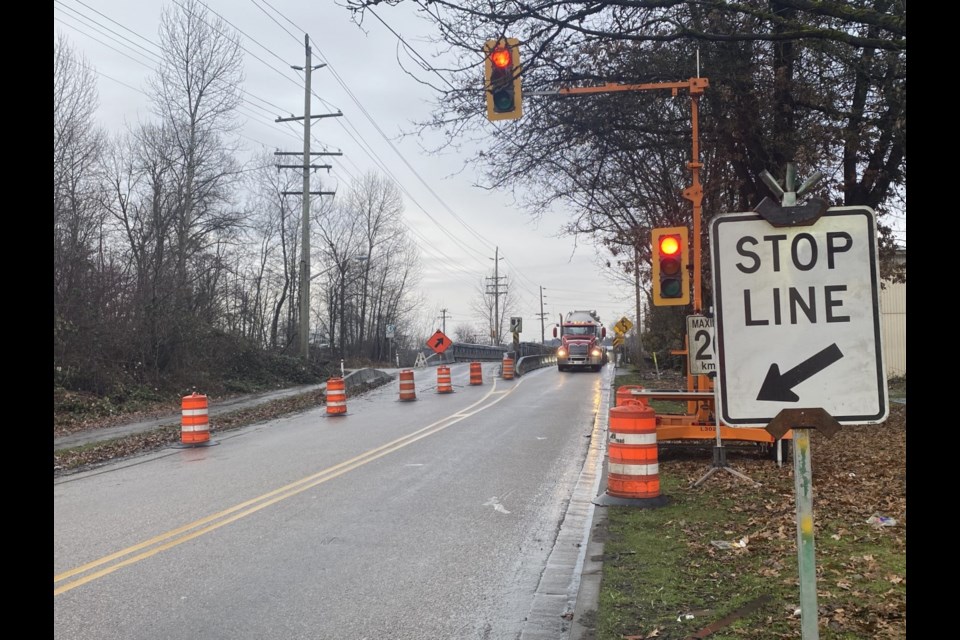Repairs on the eight-year-old Bailey Bridge that links New West and Coquitlam are expected to be complete next week.
Kwaku Agyare-Manu, the city’s senior manager of engineering services, said construction started on Jan. 23. While the work is underway, single-lane alternating traffic is taking place on the bridge that remains open.
“We are replacing the wood decking on the Bailey Bridge,” he said in an email to the Record. “The wood decking was approaching end of life and needed to be replaced.”
Agyare-Manu said the City of New Westminster is responsible for doing the work, but the work is cost-shared with the City of Coquitlam. He said the project is expected to cost $200,000.
“Both spans of the bridge are receiving new decks,” he said.
According to Agyare-Manu, the city has an ongoing bridge inspection and maintenance program that ensures the safety of structures across the city.
“The current replacement of the wooden deck on the Bailey Bridge will be completed by Friday, Feb. 17,” he said. “We thank the industrial park and users of the bridge for their patience while this work is being completed.
A worker at the site asked the Record to remind motorists to avoid blocking driveways along the stretch of road, while waiting to cross the bridge, as it makes it challenging for large trucks to turn.
Located in the Braid industrial area, the twinned Bailey Bridge is the route many New Westminster residents take to get to businesses on United Boulevard, including the United Boulevard Recycling and Waste Centre.
Two side-by-side Bailey Bridges opened at the site in the spring of 2015. That came after the single-lane bridge that had been built at that location in 1994 was closed to vehicles in March 2014, when it was deemed to be structurally unsafe.
The twinning of the Bailey Bridge came after years of disputes between the cities of New Westminster and Coquitlam, which included provincial arbitration and a court case between the two cities. New West supported the retention of a single-lane crossing when the aging bridge was replaced, but Coquitlam pressed for a two-lane bridge – with a provincial arbitrator siding with Coquitlam in mid-2014.
The City of New Westminster’s main concern with a two-lane crossing was that a second lane would encourage more traffic to travel through the area and would create safety issues if vehicle traffic backed up next to the busy railway corridor.
When the original single-lane crossing was replaced, New Westminster picked up the bill for the first crossing, which was about $600,000. New West and Coquitlam split the cost of the second $1.2-million crossing.
At the time the twinned bridges were built in 2015, the city’s project manager told the Record that the new structures would be built to today's standards, which are a bit higher than those of the former bridge.
"By going to a stronger bridge, there will be less maintenance to us in the long run," staff told the Record in 2015. "These bridges are anticipated, with maintenance, to last a lot longer."
Asked about the need to repair the deck on an eight-year-old bridge, Agyare-Manu said the useful life of wood decking is heavily dependent on the traffic loading.
“Given the traffic volumes, especially with the prevalence of heavy vehicles, we can estimate a standard useful life of eight years for the Bailey Bridge decking,” he said. “For context, an asphalt arterial road with similar loading requires resurfacing approximately every 10 years.”
Follow Theresa McManus on Twitter @TheresaMcManus
Email [email protected]




